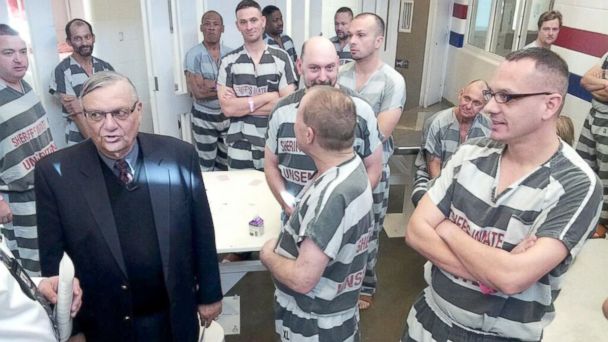Arizona Sheriff Joe Arpaio to House Jailed Vets Together
In Phoenix, more than 200 veteran inmates have been told they will be moving to a segregated wing of the Maricopa County Jail.
During a press conference today, Maricopa County Sheriff Joe Arpaio formally announced his plan to house approximately 250 veteran inmates together, in a housing unit that dons "patriotic décor" and features special behavioral programming aimed at dealing with symptoms of post traumatic stress disorder (PTSD).
PTSD continues to plague military veterans returning from combat in Iraq and Afghanistan - and for incarcerated veterans, coping with the disorder without the help of friends or family can be even more difficult.
Sheriff Arpaio has called himself "America's toughest sheriff," particularly on immigration. In October, a federal judge ordered an independent monitor to oversee Arpaio, after ruling that the Maricopa County Sheriff's Office singled out Latinos for detention. Now Sheriff Arpaio says he wants to help veteran inmates dealing with PTSD.
"It is my hope that this program will give you the tools and opportunity to address issues that you are facing in your life and will assist you in getting back on your feet and back to the way of life that you served to protect," Arpaio wrote in an open letter to the inmates being moved.
Programs like these have popped up across the country in recent years, with veteran inmate wings opening in Georgia and Los Angeles. Phoenix's program is similar to one implemented more than three years ago in San Francisco County.
At San Francisco's County Jail Five in the San Bruno Jail Complex, the COVER program (Community of Veterans Engaged in Restoration) has been housing incarcerated veterans together since September 2010.
County sheriff's office spokesperson Susan Fahey says the 48 veterans in COVER go through intensive programming every day, and she doesn't hear complaints from inmates saying they don't want to be there.
"From what I've seen, the inmates seem to be very appreciative to have something tailored to them," Fahey said to ABCNews.com. "It's based on the core roots of their behavior, and finds out what their triggers are."
Using sheriff's department money through a Bureau of Justice Assistance grant, the COVER program utilized a group therapy curriculum named Seeking Safety to address symptoms of PTSD in veteran inmates. That grant expired in September of this year, and they have lost their daily staff member dedicated to the curriculum, although regular psychiatric help is still available.
The COVER program also focuses on providing veteran inmates with resources to fall back on once they're released. To help provide housing and employment outside of cell walls, San Francisco County works with the area's No Violence Alliance, a group dedicated to decreasing city violence by rehabilitating ex-offenders.
In San Diego County, a module within one of the jails currently houses 32 veteran inmates, part of a voluntary program aimed at transitioning jailed veterans into the community.
The San Diego program is just short of six weeks old, and so far has reintegrated one veteran into service at Southern California's Camp Pendleton, something program leaders say can be attributed to the amount of services available to veteran inmates.
"At other jail facilities, programming is based on a wait list," Capt. Erika Frierson, who's with the San Diego County Sheriff's Office, said to ABCNews.com. "Upon their arrival in the program, veterans undergo a risk and needs assessment to find out what they need to be a successful citizen." Frierson says that assessment gets veteran inmates the help they need as soon as possible.
In addition to the veteran inmate's module being "the cleanest one in the entire jail," San Diego County utilizes a core program called Thinking for a Change, which aims to make sure veteran inmates have an established plan upon release.
"Having a V.A. specialist day-to-day allows us to work closer with the inmates, with the hope they don't re-offend," Capt. Frierson said. "Veterans are entitled to more services than the typical citizen who is arrested, so now more veterans are identifying as such because they want to be a part of this."
Back in Phoenix, Arpaio hopes to use segregated housing as a way to honor veteran inmates' commitment to service.
"This program is our way of letting you know that we have not forgotten that commitment, despite whatever circumstances in your life have landed you into the custody of the Maricopa County Sheriff's Office," Arpaio wrote in his open letter.
The program will integrate incarcerated veterans who have been jailed for a wide range of crimes, including aggravated DUI, burglary and aggravated assault.
